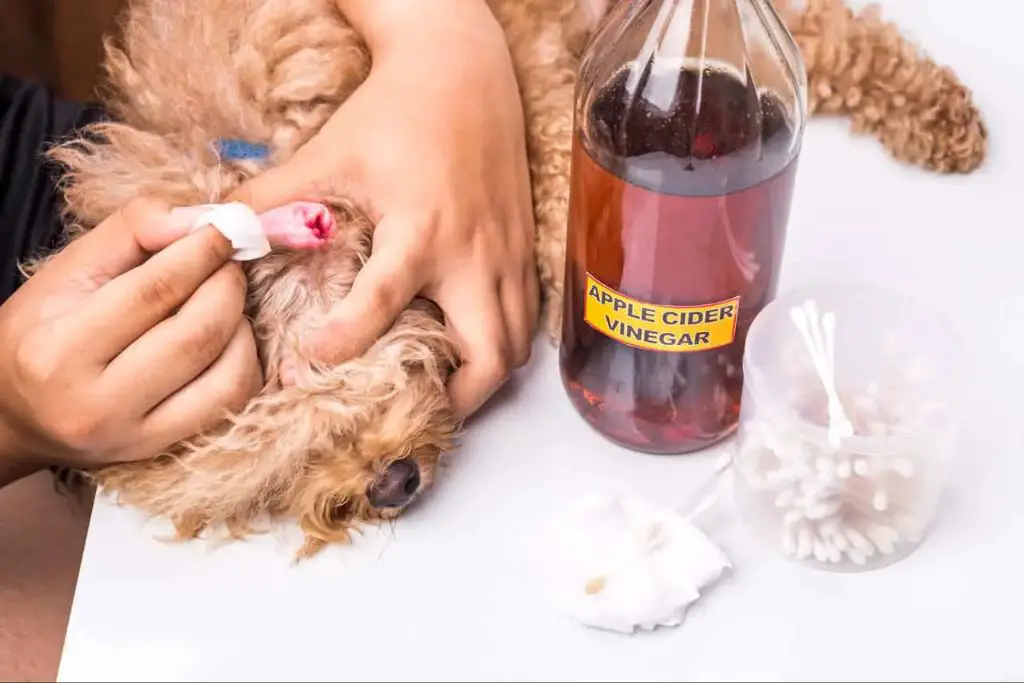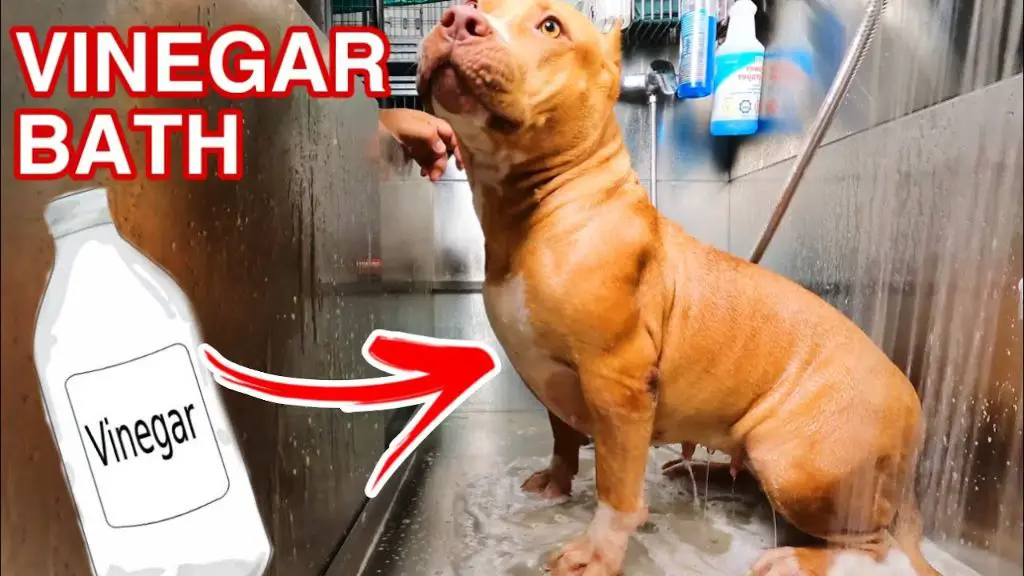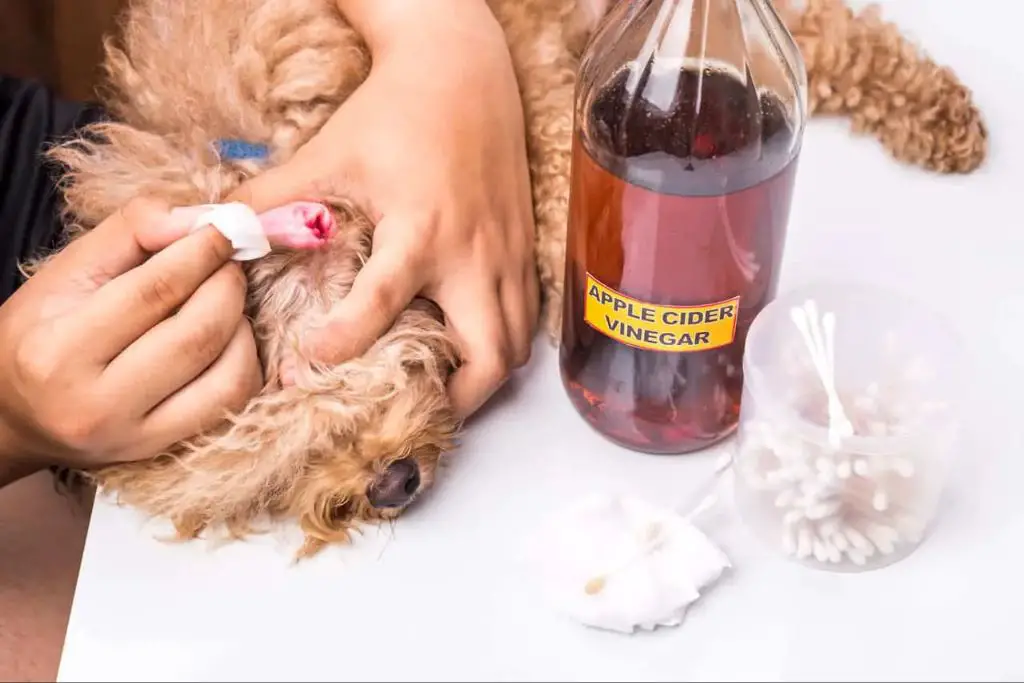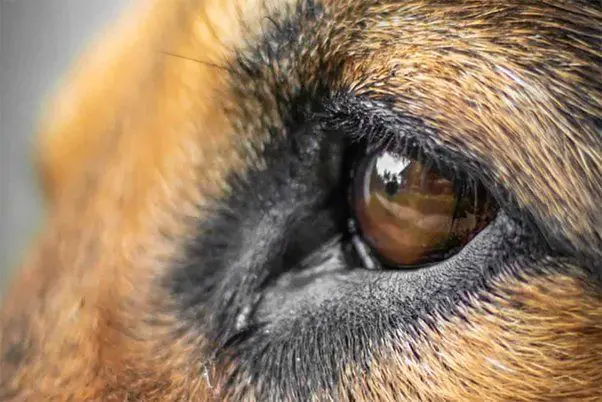Introduction
Using vinegar on dogs is an inexpensive, natural way to help repel fleas, ticks, and other pests. Vinegar contains acetic acid, which research shows can effectively kill many types of insects and deter them from biting your pet. Diluted vinegar also helps make your dog’s skin more acidic, which fleas dislike.

While vinegar alone likely won’t fully prevent or treat a major flea infestation, it can be used as part of a flea control regimen for your dog. This includes regularly grooming and bathing your dog, vacuuming your home, washing bedding on hot cycles, and using vet-recommended products.
Vinegar should always be diluted before applying it to your dog’s skin or coat. Using apple cider vinegar or white distilled vinegar, you can make DIY sprays, add it to bathwater, apply it during grooming, and more. However, you’ll want to take some precautions, as undiluted vinegar can irritate skin and shouldn’t be used on certain dogs.
How Vinegar Repels Bugs
Vinegar is an effective natural repellent for bugs, especially fleas, because of its high acetic acid content. Acetic acid gives vinegar its distinct sour smell and flavor. This acidic component creates an unappealing environment for bugs like fleas, ticks, and mosquitos.
Fleas dislike the strong scent and taste of acetic acid. Vinegar interferes with flea enzymes and bacteria needed for their survival. The acetic acid can repel fleas and even kill larvae and eggs. Vinegar’s acidity can help alter the pH on your dog’s skin, making it inhospitable for those pesky parasites.
Ticks also detest the smell and taste of vinegar. Splashing or spraying a vinegar solution directly on ticks can cause them to release their grip on your dog. Vinegar may also deter ticks from latching on in the first place. The acetic acid works to repel a variety of insects, helping protect your dog’s skin.
Using Vinegar in Dog Baths
One easy way to leverage the bug-repelling power of vinegar is by adding it to your dog’s bath water. The acidic nature of vinegar makes dogs’ skin inhospitable for fleas, ticks, and other pests.
To use vinegar in a dog bath, start by drawing a regular bath with shampoo and warm water. For medium or large dogs, add 1-2 cups of apple cider vinegar or white vinegar to the water. For small dogs, add 1/2 to 1 cup. Make sure the vinegar is well mixed into the bath water before bringing your dog into the tub.

The proper vinegar-to-water ratio for dog baths is about 1:20. That means 1 part vinegar for every 20 parts water. Too much vinegar can dry out your dog’s skin, so it’s important not to overdo it. But this diluted concentration should repel bugs without irritating your dog’s skin.
Let your dog soak in the vinegary bath water for 5-10 minutes to allow the solution to fully permeate their coat and skin. Then rinse them off with clean water and finish bathing as usual. The vinegar smell will dissipate as they dry.
Give your dog occasional vinegar baths during flea and tick season to help repel infestations. The vinegar bath creates an unfavorable environment for bugs to live on your dog’s body. While not a standalone treatment, adding vinegar to bathwater is an easy and natural way to deter pests.
Vinegar Sprays for Dogs
Making a vinegar spray is an easy and inexpensive way to help repel bugs on your dog. You’ll just need a spray bottle, white vinegar, and water.
A basic 50/50 vinegar spray can be made by mixing equal parts white vinegar and water in a spray bottle. Shake well before use. Make sure to avoid your dog’s eyes, nose, and mouth when spraying.
For a stronger bug repellent spray, use a 70/30 or 80/20 mix of vinegar to water. You may also add a few drops of citronella, peppermint, eucalyptus, or lemon essential oils to enhance the bug repelling properties.

Spray your dog’s coat thoroughly before going outside, especially focusing on the legs, underbelly, and ears. Reapply as needed, such as after swimming. The vinegar smell dissipates as it dries.
Vinegar sprays can be used daily to discourage biting insects. They are gentle enough to use on puppies and dogs with sensitive skin. Be aware some dogs may try to lick themselves after spraying.
Other Vinegar Uses on Dogs
In addition to baths and sprays, there are other ways to use vinegar on dogs to help deter bugs:
Wipes: Mix equal parts vinegar and water in a spray bottle. Then soak a clean cloth or paper towel and gently wipe down your dog. Focus on wiping legs, belly, and other areas bugs tend to bite. The vinegar smell can help mask your dog’s natural odors and make them less attractive to bugs.
Rinses: For dogs with sensitive skin, dilute vinegar with more water for a post-bath rinse. A 50/50 vinegar and water rinse can help remove shampoo residue and restore your dog’s natural pH balance. Start with 1 cup vinegar diluted in 1 gallon of water.
Spot treatment: Dab undiluted vinegar onto specific bug bites using a cotton ball. This can provide itch relief and prevent infection due to scratching. Monitor your dog closely, as licking of the vinegary area could occur.
Always monitor your dog for skin irritation with topical vinegar use. Discontinue use if redness or itching develops. Consult your veterinarian if issues persist.
Risks and Precautions When Using Vinegar on Dogs
While vinegar is generally safe to use on dogs, there are some risks and precautions to keep in mind:
Avoid getting vinegar in your dog’s eyes, ears, nose, or mouth. Vinegar can irritate or even damage these sensitive areas. Be careful when spraying vinegar mixes directly onto your dog.

Don’t overdo vinegar usage. Small amounts of diluted vinegar are safe, but large quantities or frequent use could lead to skin irritation or GI upset. Start with minimal applications.
Test on a small area first. Apply a dime-sized amount of diluted vinegar to a small patch of skin and look for redness or irritation before wider use.
Keep vinegar away from open wounds or hot spots. The acidity can cause stinging and pain.
Don’t use vinegar that is too strong. Opt for a 5% acidity solution diluted with water. More concentrated versions may cause harm.
Rinse thoroughly after bathing. Make sure all traces of vinegar are washed off your dog’s coat.
Talk to your vet if your dog has skin sensitivities. They can advise if vinegar will be safe or irritating.
Monitor for side effects like dry skin or GI distress. Discontinue use if any concerning symptoms develop.
Other Natural Repellents
While vinegar is an excellent all-natural bug repellent for dogs, there are other effective options if you want to avoid using vinegar for any reason. Some popular alternatives include:
Essential Oils: Many essential oils have bug and insect repelling properties, including citronella, peppermint, lemongrass, eucalyptus, and rose geranium oils. You can mix a few drops of essential oils with a carrier oil like coconut or almond oil and apply it to your dog’s coat. Be cautious with essential oils around your dog’s eyes, nose, and mouth. Only use oils labeled safe for dogs. Start with diluted oils and monitor your dog closely.
Herbs: Herbs like lavender, thyme, basil, marigolds, and pennyroyal can help deter mosquitoes, fleas, ticks and other bugs when grown around your home or yard. You can also rub crushed fresh herbs like lavender into your dog’s fur. However, take care, as some herbs are toxic for dogs. Only use dog-safe herbs.
When to See a Vet
In most cases, using vinegar and other natural repellents is an effective and safe way to control occasional bug infestations on dogs. However, there are certain situations when you may need to seek veterinary care:
Persistent Infestations: If bugs like fleas and ticks continue to be a major problem even after trying vinegar and other remedies, it’s best to see your vet. They can prescribe stronger medications and treatments to fully eliminate an infestation.
Skin Irritation: Vinegar can sometimes cause skin irritation, especially if not properly diluted. Red, inflamed, or itchy skin after using vinegar likely signals an allergic reaction or overuse. Discontinue vinegar and visit your vet if the irritation persists or worsens.
Your vet can check for skin infections, recommend medications to soothe irritation, and help you determine if vinegar should be avoided in the future. They can also suggest alternative natural remedies that may be gentler on your dog’s skin.
Vinegar vs Other Treatments
Vinegar is often compared to other bug repelling products and treatments for dogs, such as medicated shampoos, sprays, and collars. While these products can be effective, they tend to rely on chemical pesticides to ward off pests. This exposes dogs to potentially harsh chemicals and risks side effects.
Vinegar provides a safe, natural alternative to these chemical-based treatments. When used properly, vinegar can provide similar bug repelling power without subjecting dogs to medicated chemicals. While vinegar may need to be reapplied more frequently than some medicated products, many owners feel this is an acceptable tradeoff to avoid chemical exposure.
One advantage of vinegar is that it can be used alongside other treatments. While some medicated shampoos and sprays should not be combined, vinegar is generally safe to use with other remedies. For example, a vinegar rinse can be applied after bathing with medicated shampoo.
Overall, vinegar offers dog owners a versatile, affordable, and chemical-free tool for warding off bugs. While no treatment is 100% effective all the time, vinegar can be a valuable addition to a dog’s pest management regimen.
Conclusion
Vinegar can be a safe and effective natural repellent for dogs when used properly. Adding a vinegar rinse to baths creates an unappealing scent that bugs dislike. Spraying diluted vinegar directly onto dogs’ coats also helps keep away mosquitoes, fleas, and ticks. Taking precautions like avoiding contact with eyes and being aware of skin sensitivity reduces risks. While vinegar has benefits, other repellents like essential oils and insecticidal shampoos can also be considered. Checking with a veterinarian is advisable if infestations persist. Overall, vinegar is a handy item to have around when looking to deter bugs, but other prevention and treatment options should be explored as well.